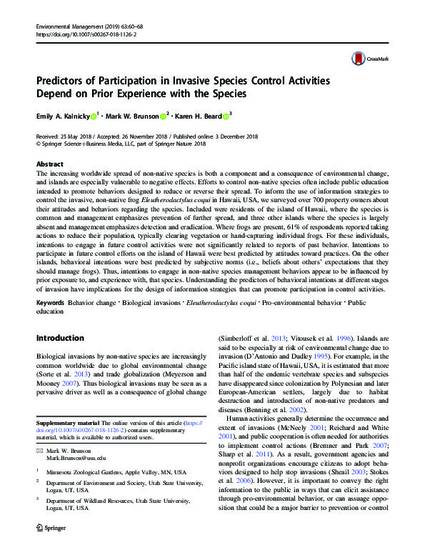
Article
Predictors of Participation in Invasive Species Control Activities Depend on Prior Experience with the Species
Environmental Management
(2019)
Abstract
The increasing worldwide spread of non-native species is both a component and a consequence of environmental change, and islands are especially vulnerable to negative effects. Efforts to control non-native species often include public education intended to promote behaviors designed to reduce or reverse their spread. To inform the use of information strategies to control the invasive, non-native frog Eleutherodactylus coqui in Hawaii, USA, we surveyed over 700 property owners about their attitudes and behaviors regarding the species. Included were residents of the island of Hawaii, where the species is common and management emphasizes prevention of further spread, and three other islands where the species is largely absent and management emphasizes detection and eradication. Where frogs are present, 61% of respondents reported taking actions to reduce their population, typically clearing vegetation or hand-capturing individual frogs. For these individuals, intentions to engage in future control activities were not significantly related to reports of past behavior. Intentions to participate in future control efforts on the island of Hawaii were best predicted by attitudes toward practices. On the other islands, behavioral intentions were best predicted by subjective norms (i.e., beliefs about others’ expectations that they should manage frogs). Thus, intentions to engage in non-native species management behaviors appear to be influenced by prior exposure to, and experience with, that species. Understanding the predictors of behavioral intentions at different stages of invasion have implications for the design of information strategies that can promote participation in control activities.
Disciplines
Publication Date
2019
DOI
https://doi.org/10.1007/s00267-018-1126-2
Citation Information
Karen H. Beard. "Predictors of Participation in Invasive Species Control Activities Depend on Prior Experience with the Species" Environmental Management Vol. 63 (2019) p. 60 - 68 Available at: http://works.bepress.com/karenh_beard/313/
